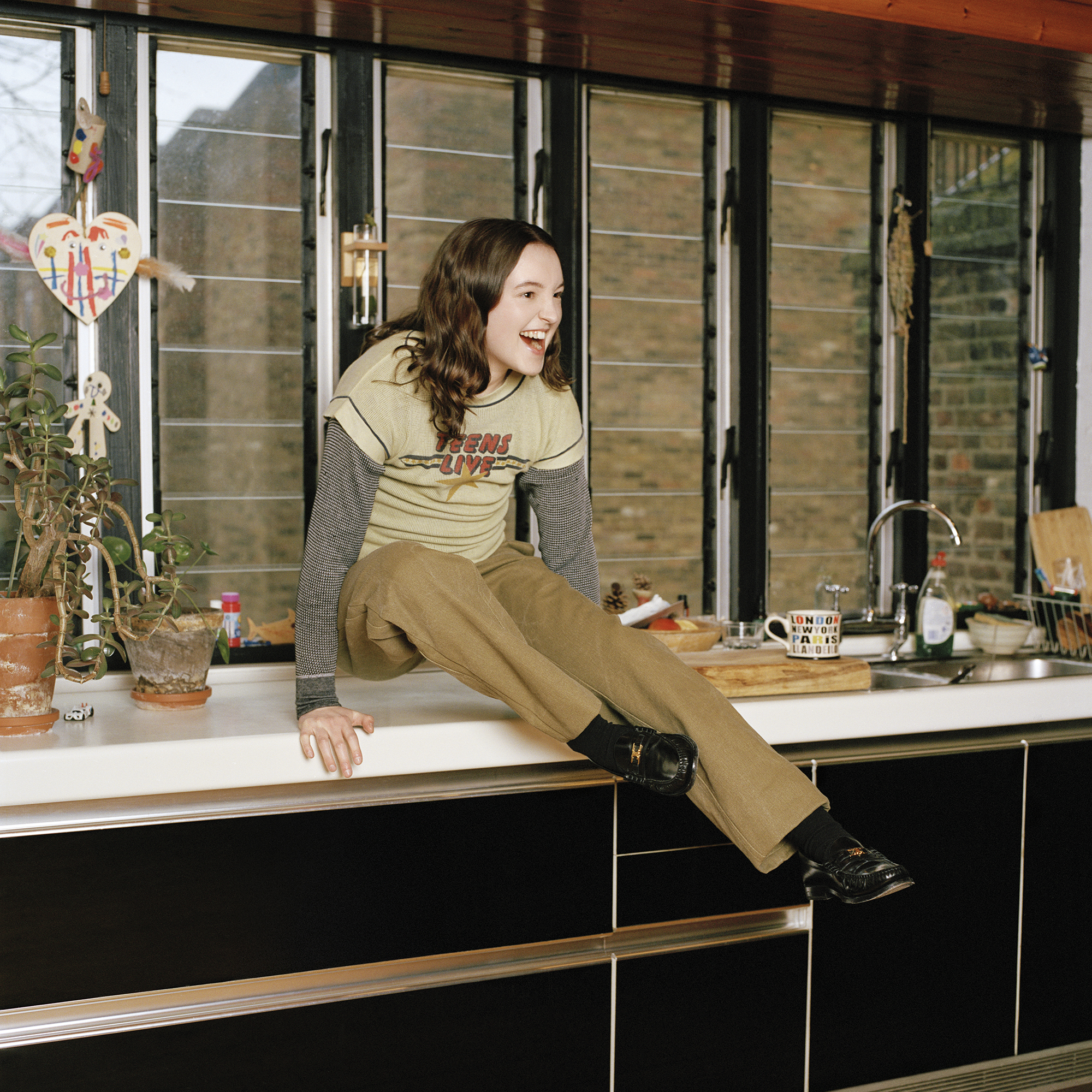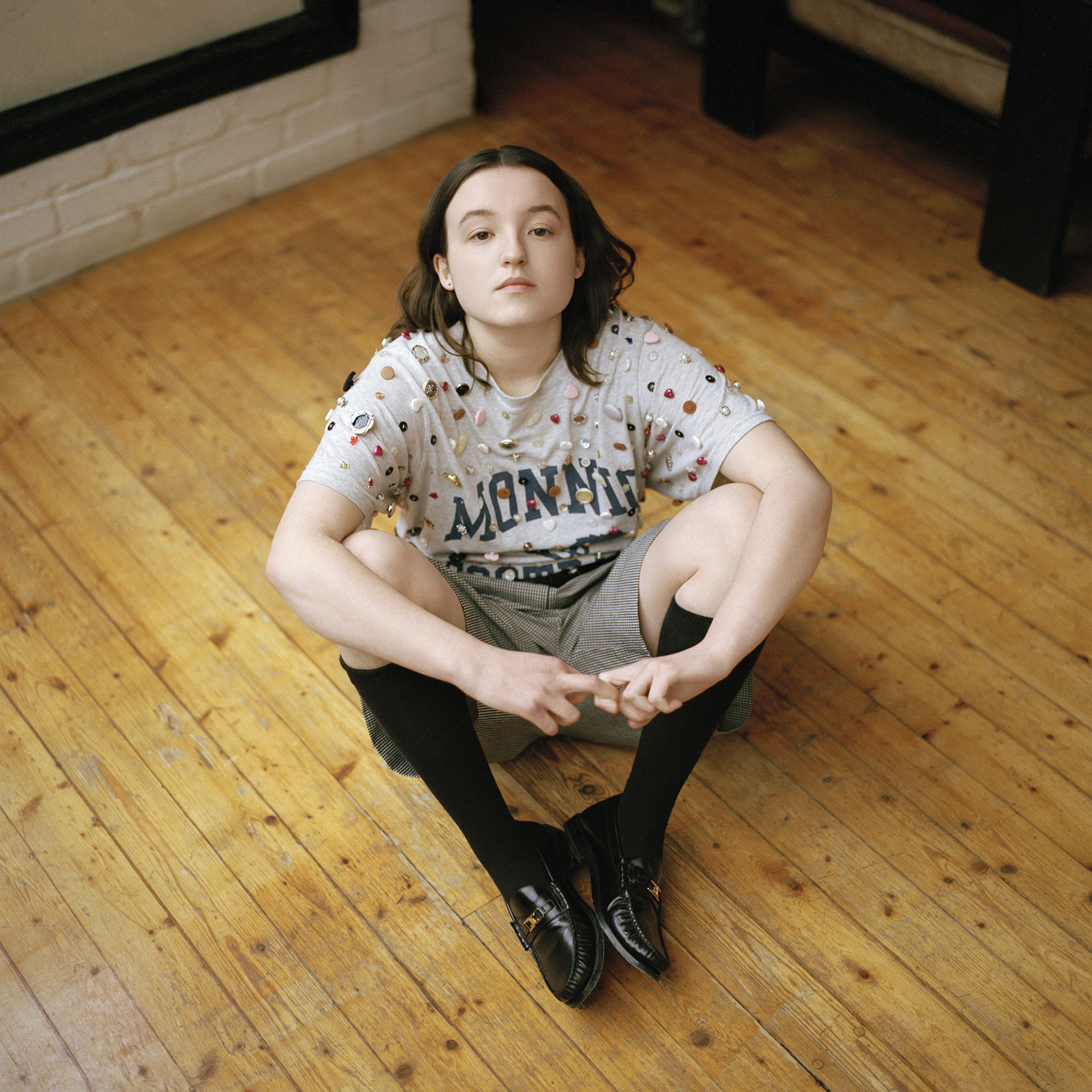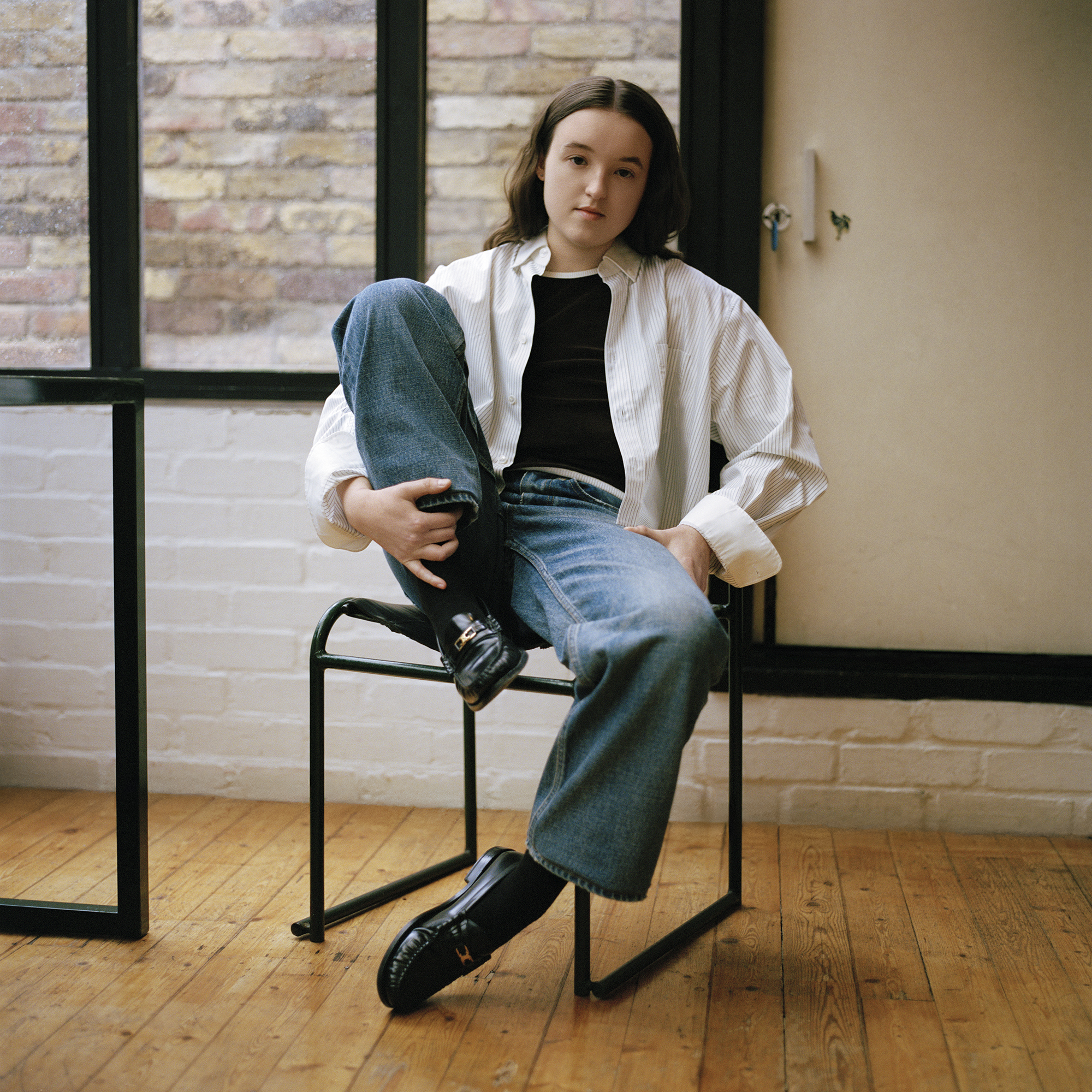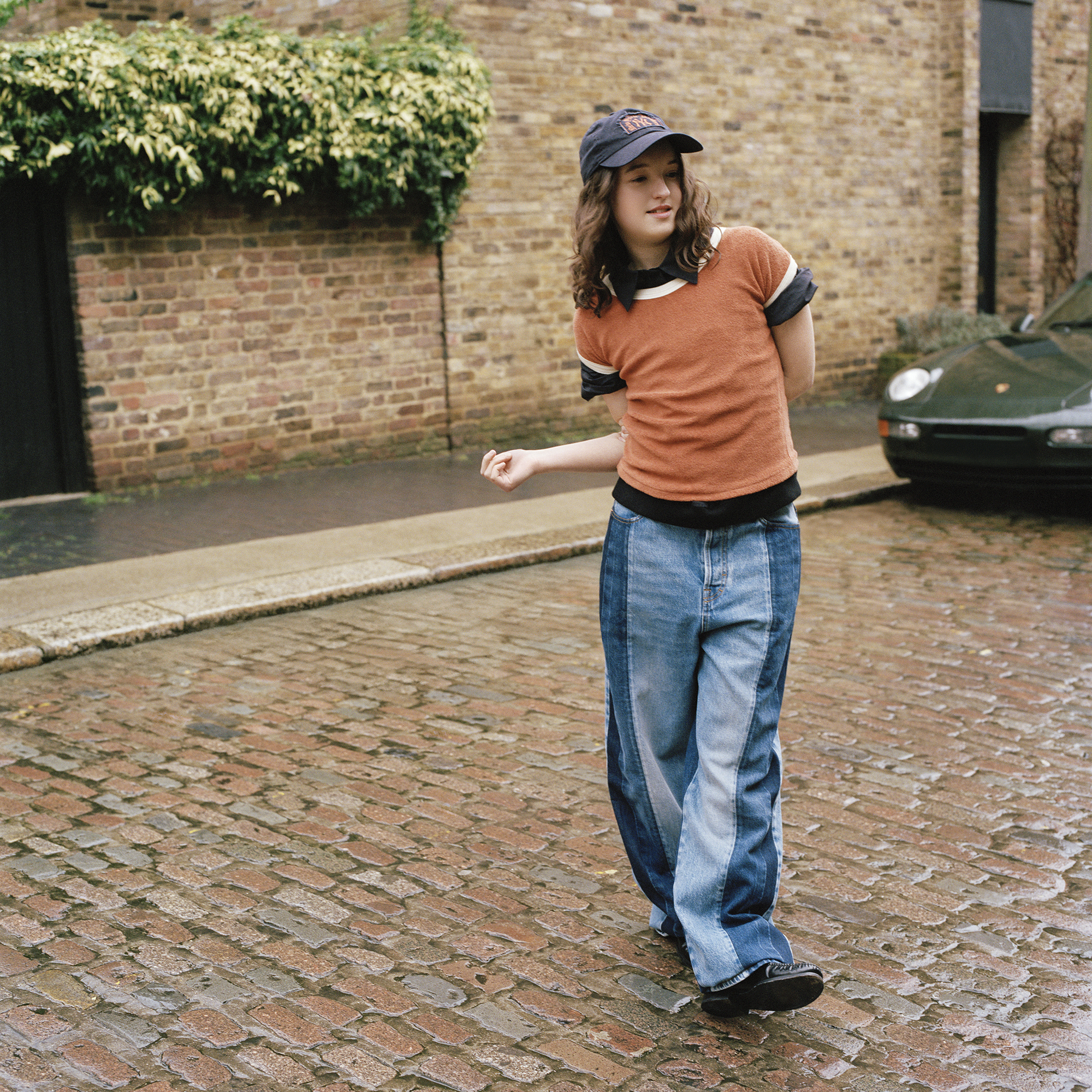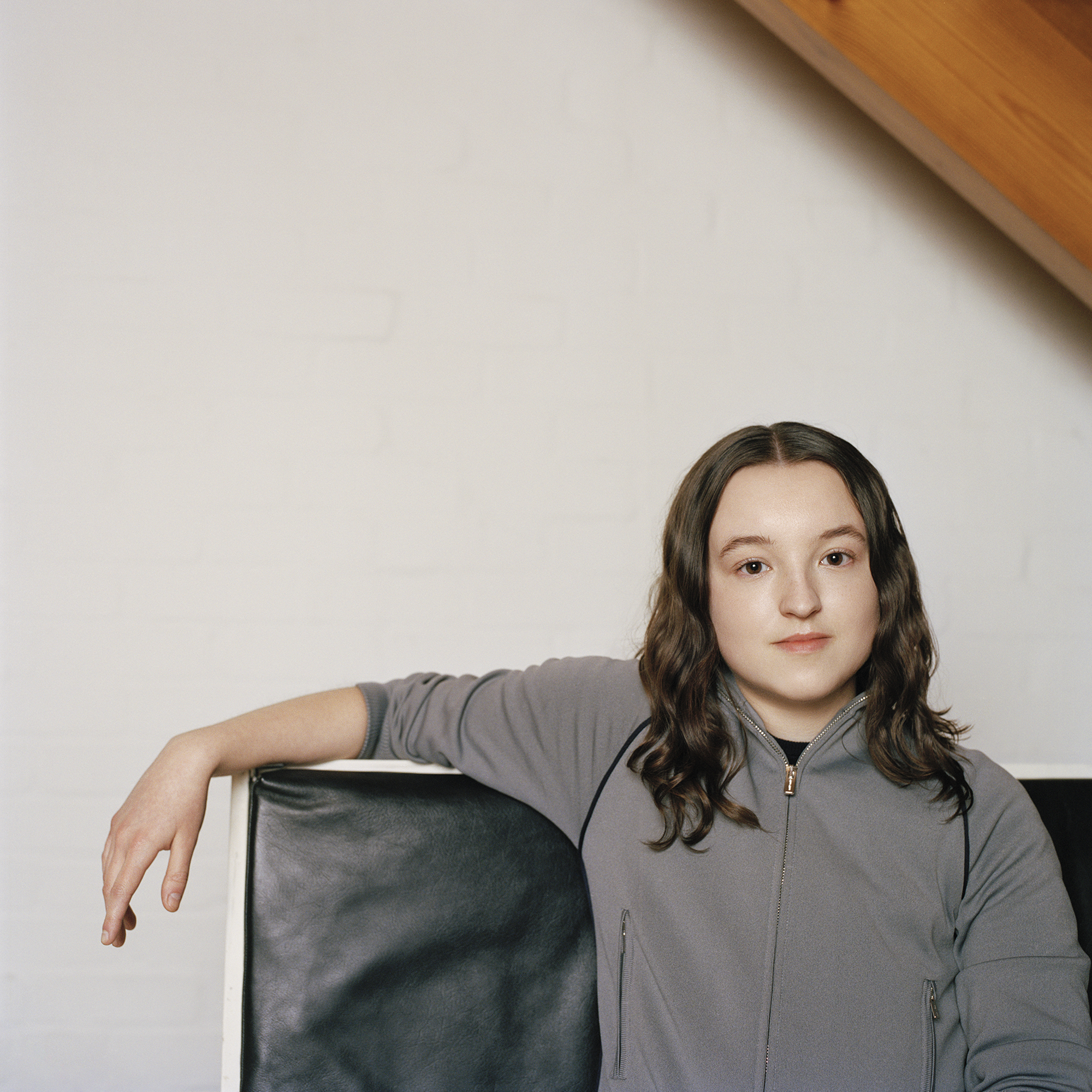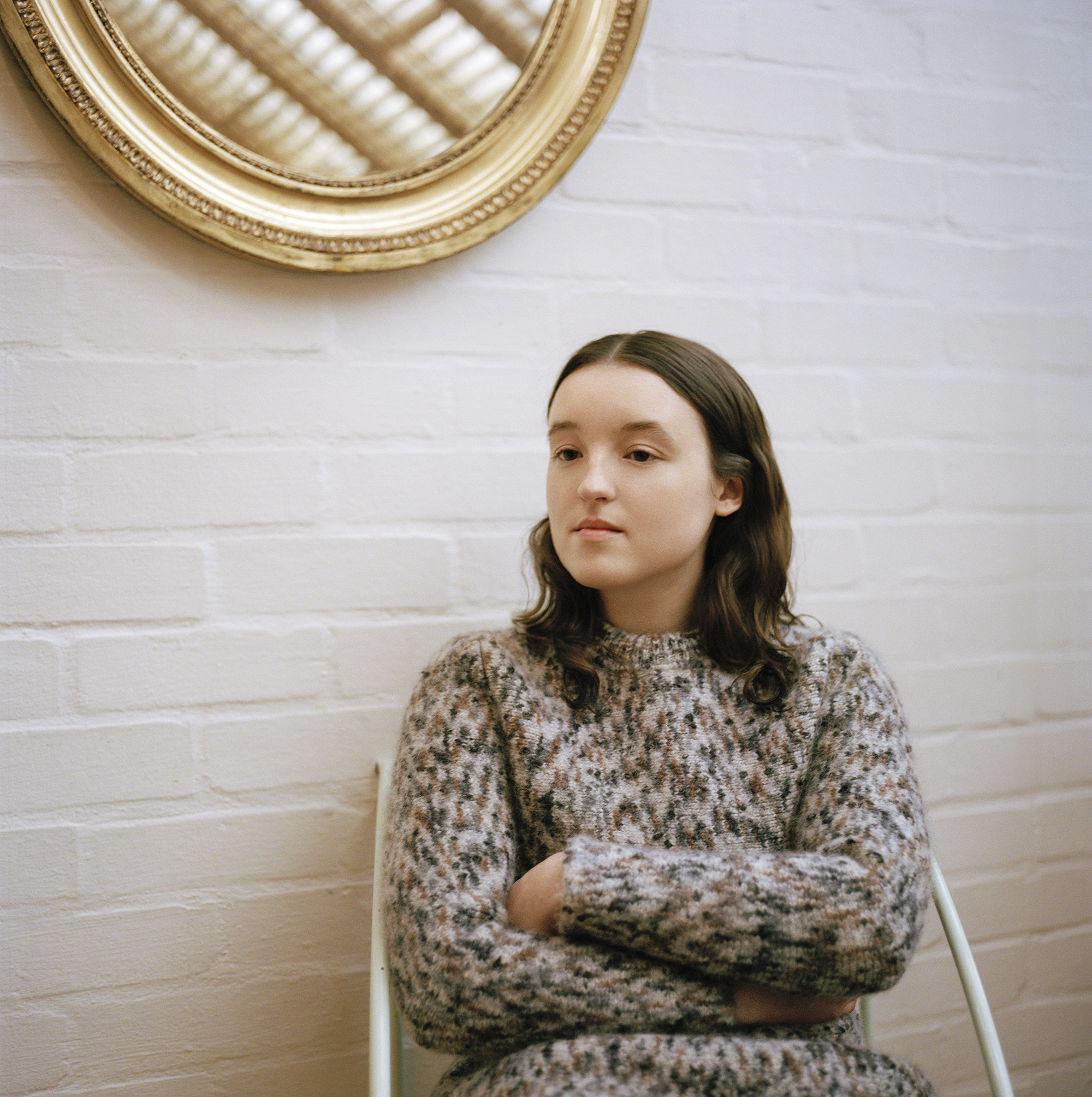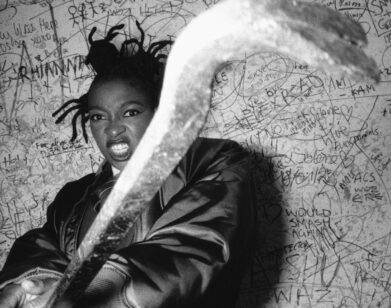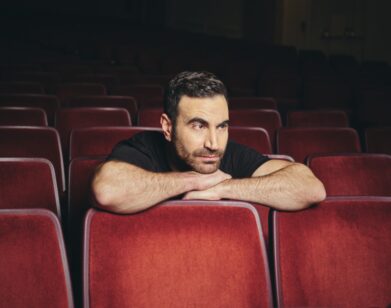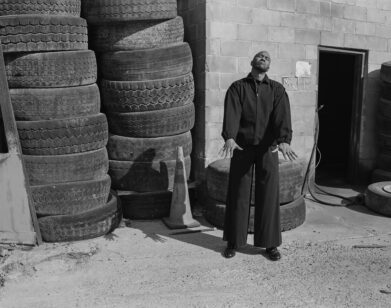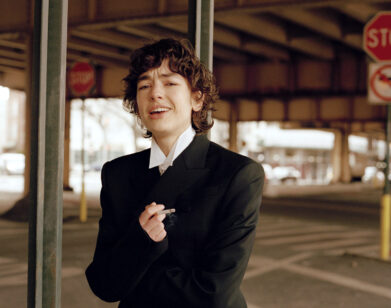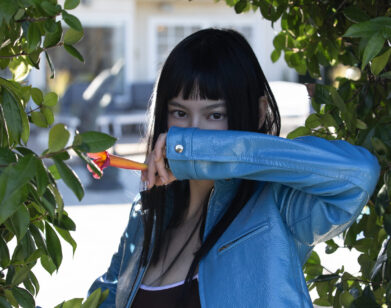ACTOR
Bella Ramsey and Kit Harington on the Psychic Toll of Stardom
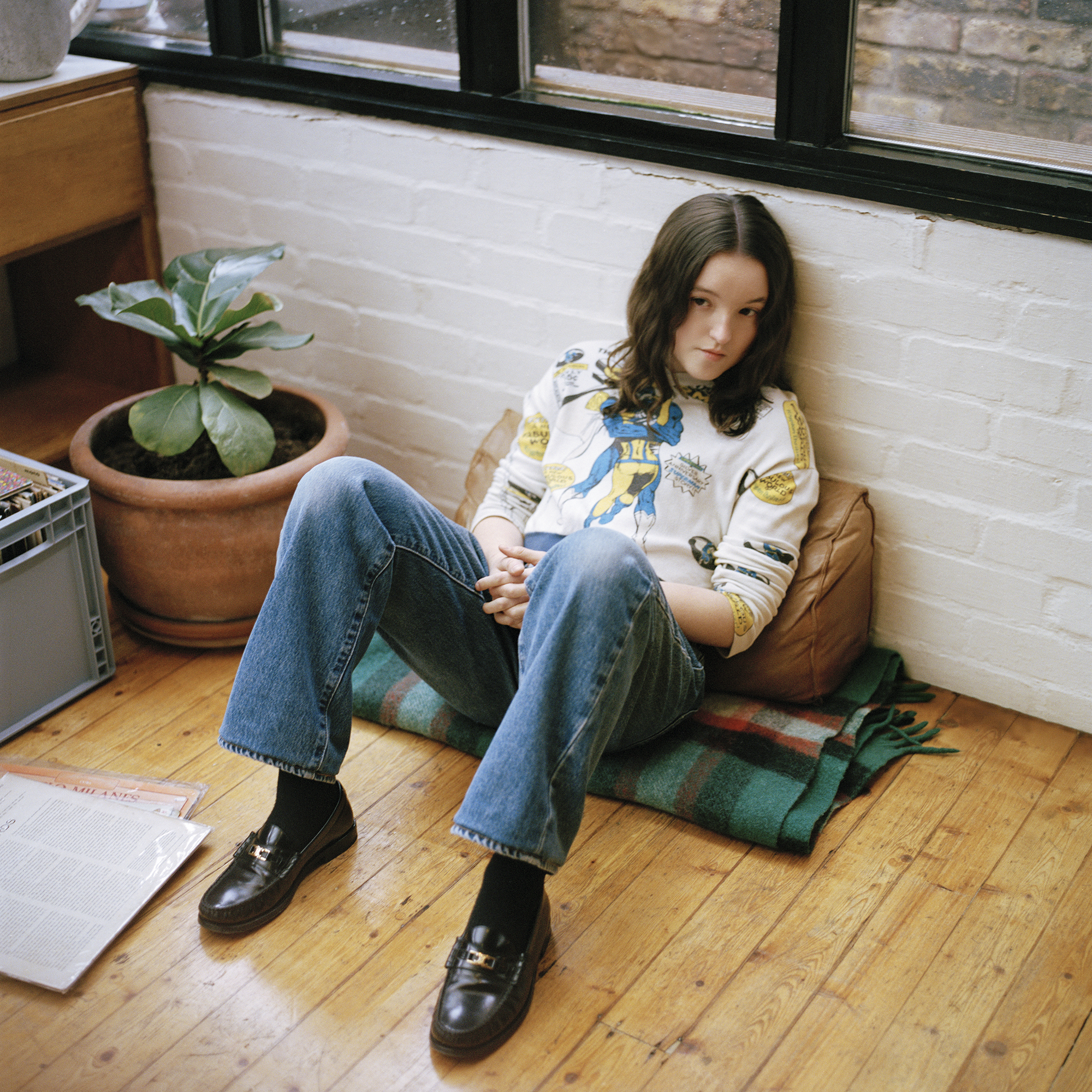
Bella Ramsey wears T-shirt The Contemporary Wardrobe. Jeans The Arc. Shoes (worn throughout) Celine by Hedi Slimane.
At 11, with zero experience and nothing to lose, Bella Ramsey stormed onto Game of Thrones and stole every scene they were in. As Lyanna Mormont, they left us all asking: Who is this kid? A decade later, they’re not a kid anymore—they’re leading HBO’s latest juggernaut, The Last of Us, as Ellie, a sharp-tongued survivor with the fate of humanity on her shoulders. Kit Harington knows Ramsey’s power firsthand, but when he called up his former Thrones costar, work was just the beginning of their conversation.
———
THURSDAY 6 PM FEB. 27, 2025 LONDON
KIT HARINGTON: Hey!
BELLA RAMSEY: Hello!
HARINGTON: How are you?
RAMSEY: Good. I haven’t seen you in a long time.
HARINGTON: I was trying to figure out when I last saw you.
RAMSEY: I was 14 when we did the last season of Game of Thrones and now I’m 21, so a long time.
HARINGTON: Did I not see you in between? I feel like I have.
RAMSEY: I think you saw me when you were in a taxi. I remember walking down the street and you leaning your head out and yelling, “Bella!” It was terrifying, and then I saw that it was you and it was very sweet.
HARINGTON: Blimey. How have you been?
RAMSEY: Busy. All grown up now.
HARINGTON: Are you still based in London?
RAMSEY: Yeah, I just moved here in October. Before, I was still up in Leicestershire with my parents, so it’s pretty new. You’re not in London?
HARINGTON: Sometimes, but I’m sort of in the countryside. I’ve done the opposite thing. Me and Rose [Leslie, Harington’s wife] have moved out. We’re now little country mice. It’s very domestic.
RAMSEY: Where are you right now?
HARINGTON: I’m in Paris at the moment. I’m doing a film out here.
RAMSEY: Ooh.
HARINGTON: It’s been quite delightful. I never really got Paris until this trip, and now I’m slightly obsessed with it.
RAMSEY: I feel like I haven’t got Paris yet either. I’ve only been there for interviews, magazine things. Normally I’m ready to leave after I’ve done those things.
HARINGTON: That was my experience of this city. I’m whisked here to do something, I saw the inside of a hotel room, it was all a blur, and then I left. This time, I came a few days early and Rose came out and joined me and we just did all the tourist things and it’s great.
RAMSEY: Nice.
HARINGTON: Yeah, really nice. Anyway, I’m meant to be interviewing you. I’m so nervous about this. I’ve written a list of questions.
RAMSEY: I did one of these for a friend a few months ago and it was really scary.
HARINGTON: Don’t expect the most insightful, hard-hitting questions from me. It’s pretty basic. I guess I wanted to reminisce about how we met and what that was like for you. And I’m sorry if you’ve been asked this a million times.
RAMSEY: I actually haven’t. People don’t really ask me about Game of Thrones anymore.
HARINGTON: Good. What do you remember of that time?
RAMSEY: I would’ve been 11 when we first met. It was my first job ever, so I had no reference point for what it would be like. I weirdly wasn’t nervous at all, because I never knew that I wanted to be an actor, so I didn’t have a bunch of expectations. I was coming into it very much blind.
HARINGTON: I remember meeting you—it was the first thing you did where we had to come and address you, asking for soldiers.
RAMSEY: Oh yeah, I remember that.
HARINGTON: I’m going to blow a bit of smoke here, so I’m sorry, but there was a real feeling of you being a different entity of child actor. We were like, “Oh, they’re good.”
RAMSEY: Aw, that’s sweet.
HARINGTON: You brought a confidence and clarity that was quite unusual for a young actor. It didn’t feel like working with a child. It felt like working with a very experienced actor.
RAMSEY: I remember not feeling like a child, but now I see 11-year-olds and realize how tiny they are, so it’s weird to me that I was that size and that young, because I didn’t feel that tiny. I don’t know whether you remember this, but I remember it quite vividly and have some remorse for it now, but during that scene I was mouthing your lines to you.
HARINGTON: Yes!
RAMSEY: Now I’m like, “Oh my gosh, how awful.” But at the time it came from a very innocent place of being like, “Kit’s struggling with his line and I know it, so let me just mouth it to him.”
HARINGTON: I do remember you helping me out and it being quite humiliating. [Laughs] But yeah, thanks for that. I’ve probably chosen to forget it.
RAMSEY: You’re welcome. No, I think I need to forget it, because that’s so annoying. Like, how annoying is that?
HARINGTON: It wasn’t at all. If anything I was like, “Oh god, I’ve got to up my game. I came here not really being comfortable enough with my lines, in the arrogance of however old I was, thinking I’m just opposite some child. And then that child actor is wiping me off the screen.” Not that it’s a competition, but you’re like, “Oh, I’ve got a bit too comfortable in my Jon Snow-ness.”
RAMSEY: You had six seasons of it by then, so fair enough.
HARINGTON: Yeah, it was a long slog. How’s The Last of Us circus been? I don’t mean the actual filming of it, I mean all the stuff around it, which I kind of know of.
RAMSEY: That’s a good question. I knew that I was going to be introduced to the circus around big TV shows and films with The Last of Us. I never really had that experience before. I always managed to be in stuff not quite enough to have to do all the press. But now, I feel like it came at a time at which I was prepared to deal with it. I mean, I sort of dread it all, but this time around I feel like I really know what it is and care about it a lot less than I did the first season.
HARINGTON: Right.
RAMSEY: It’s always felt quite trivial, and I’ve never really enjoyed it, but I can just accept I’m going to go and do it, it’ll be what it will be, and then it will be done. I was so terrified of signing on to The Last of Us and the idea of reaching a level of fame that doesn’t go away, not being able to backtrack from that. But I realize now that actually, you reach this level of fame that stays for a few months while the show’s coming out, and then it does sort of die off. If you don’t do anything to maintain that level of fame, the world moves on, which I’m so grateful for.
HARINGTON: Yeah, I remember that with my time on Game of Thrones. While the show was on, it was quite intense. I was like you, I think. My soul didn’t respond well to it in a strange way, and I had different coping mechanisms which weren’t good or healthy.
RAMSEY: Yeah.
HARINGTON: But you’re right. You kind of go, “Oh if, there wasn’t another season it will just drift away.”
RAMSEY: Yeah, exactly. It’s quite nice.
HARINGTON: So is this the first time you’ve lived alone?
RAMSEY: I lived alone during season two in Vancouver, but this is my first time living alone where I’m not away somewhere for work.
HARINGTON: It’s a big thing.
RAMSEY: Yeah, I like it. I did live with a few housemates before, and I much prefer living alone. It can be lonely, but now I’ve found friends in London close by, which is helpful. A lot of my friends are older than me and already have their lives and their friends that they’ve had since they were young, so I’m kind of on the outskirts of their life and their friend groups. It’s nice to have people around who are a similar age to me. Less lonely, for sure.
HARINGTON: I had this close group of friends when I was doing Game of Thrones who kept my head on the straight and narrow a bit, just by the virtue of them taking the piss out of me all the time.
RAMSEY: That’s good.
HARINGTON: Are you doing anything outside of The Last of Us? Are you trying to choose roles in a career sense or are you reading things and going on gut instinct?
RAMSEY: I go off my gut instinct for sure. What seem to be the things that I’m responding to are low-budget independent films, I think because of the contrast to The Last of Us. I’m about to do a film, Sunny Dancer, up in Scotland, and the idea of going and doing that for six weeks as the show is coming out is a relief. It’s just such an escape. And then outside of that, I’m writing.
HARINGTON: What are you writing?
RAMSEY: Scripts. I’ve written a feature which is sort of ready to be properly made now. It’s in a really good place, I think.
HARINGTON: Any parts for a bearded 38-year-old man?
RAMSEY: Actually maybe. I need a dad.
HARINGTON: Oh, I’m in that category now.
RAMSEY: [Laughs]. Although you’re not quite old enough. Could you be a dad to a 14-year-old?
HARINGTON: Scarily, I actually could. Send it to me, will you?
RAMSEY: I’ll keep you in mind.
HARINGTON: That’s great you’re writing. I think that’s awesome.
RAMSEY: Have you ever done any of that?
HARINGTON: Do you know what? I’ve just written and directed a short film.
RAMSEY: That’s cool.
HARINGTON: I’m a restless person and sometimes wonder why I’ve chosen to be an actor, where we sit around for so long. But as a director, you’re constantly answering questions, running around, doing things.
RAMSEY: It’s nice to do something that’s self-motivated. It’s way harder than just being a cog in a machine.
HARINGTON: Right. I’ve run out of my questions, but they gave me some. Do you want to hear some of their questions?
RAMSEY: Absolutely. Pick a good one.
HARINGTON: You played a lot of characters who are wise beyond their years. Why do you think that is, and do you ever long to play someone who’s a little more lost?
RAMSEY: Very good question. Interestingly, in playing all these people who are wise beyond their years, most of the time there’s an element of them being very lost inside, but I don’t really long to play someone who’s entirely lost. I long to play someone who’s a Hannibal Lecter type.
HARINGTON: Like proper psychotic.
RAMSEY: Yeah. I think I’m really craving some psychosis in a character.
HARINGTON: I guess maybe what that is—I have that—but it’s essentially because you’ve been playing heroes.
RAMSEY: Ah.
HARINGTON: You’re on a continual sort of hero’s journey at the moment, with most of the parts you’ve played, and then maybe there’s that inkling, like, “I want to play the messed-up person.”
RAMSEY: That’s actually a really good point. I hadn’t made that connection. Something that I meant to talk to you about was that I remember you not having social media, and admired that so much and thought you were the coolest person to ever walk the earth. I was like, “I don’t want to get social media, because Kit doesn’t have it.” And then I did end up having to get it because there were people making fake accounts pretending to be me when I was 12, and posting inappropriate stuff. But now, I’ve just deactivated my Instagram and my Twitter. I’ve reached a point where I don’t actually need this anymore. People know that a fake account pretending to be me isn’t me.
HARINGTON: When did you deactivate it?
RAMSEY: A few weeks ago, and it wasn’t even this big dramatic thing. Nothing really happened. I just got so sick of it, and it was detrimental more than helpful. I feel wonderful.
HARINGTON: I’m proud of you. I have WhatsApp to text friends and that’s it, really. I think you put the nail on the head about it being more detrimental than it is helpful. I’ve always felt that it would be very damaging to me. I have a personality type in which it would be addictive. It’s the wisest thing I’ve ever done and I’ve done some really fucking stupid things in my life.
RAMSEY: Well, it was inspiring to me.
HARINGTON: I’m glad. Let’s spread the word.
RAMSEY: I think so.
HARINGTON: It’s that double-think thing. It says this will help you communicate with more people more often, and I don’t think it does. I think it opens you to a load of weirdos and randomness, but it doesn’t actually help you communicate. We weren’t built to communicate with more than a hundred people.
RAMSEY: Exactly. Any communication is transactional. It’s a like, or a comment, or a reaction to a story. I was also very addicted to it. I would actually lose sleep. I categorically couldn’t have TikTok on my phone because there was one night that I was literally on it until the sun rose. My personality type is too susceptible to the frickin’ dopamine hits that it gives you. It was really bad.
HARINGTON: Dopamine is something that you run out of; it’s a drug that leaves your system. I think the quickest way of losing your ability to produce it naturally is to have something like social media. Well done. I’m glad to think I played a small part in that choice.
RAMSEY: You absolutely did.
HARINGTON: Good, good, good. Well it’s been awesome chatting with you.
RAMSEY: Yeah, you too.
HARINGTON: Let’s not let it go six years again. I’d love to see you sometime.
RAMSEY: That would be good.
HARINGTON: I’ll give you my number. In fact, I’ll put it in the chat now so you’ve got it.
RAMSEY: Perfect.
———
Hair: Paula McCash at Bryant Artists.
Makeup: Amanda Grossman at Forward Artists.
Nails: Lucy Tucker at Forward Artists.
Tailor: Victoria Dolman-Nash at Chapman Burrell.
Fashion Assistant: Harry Langford.
Production Management: Morgan Shepherd.
Post-Production: Matthew Richards.

